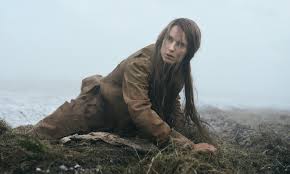Impassive, immovable, relentless – Mads Mikkelsen’s Ludvig Kahlen, a fatherless army captain turned sodbuster in Nikolai Arcel’s The Promised Land, recalls the Hollywood Western’s most obdurate “rugged individuals”.
At the peak of his powers in Nikolaj Arcel’s suspenseful saga about a territorial feud in 1750s Denmark, the star saves his weathered Silesian Wars campaigner from becoming a John Wayne-like monolith. Battlefield veteran Kahlen is a stranger to tender emotions; their impact flickers on his Mount Rushmore face, but so imperceptibly you couldn’t swear to it. It's an uncanny performance.
A transplanted Western, like Chile's recently released The Settlers, The Promised Land echoes Shane (1953) and Heaven’s Gate (1980), films inspired by the 1889-93 Johnson County (or Wyoming Range) War between big cattle ranchers and small farmers. Kahlen’s mission to grow potatoes in the infertile heath on the Jutland peninsula – to make a garden in the wilderness – triggers an attritional war with the jumped-up lordling Frederik Schinkel, who claims that he, not King Frederick II, owns the land.
Whereas the costume drama A Royal Affair (2011), Arcel and Mikkelsen’s previous collaboration, was based on historical facts, The Promised Land, adapted from Ida Jessen’s 2020 novel The Captain and Ann Barbara, liberally fictionalises the careers of pioneer farmer Kahlen (c.1700-1774) and Schinkel (1719-94), a combative judge and estate-owner in the Viborg region.
 The movie’s moral shadings aren’t as subtle as Mikkelsen’s acting. Broadly played as a smirking degenerate by Simon Bennebjerg, Schinkel routinely rapes his palace’s female servants, defenestrates one of them, and boils to death a disaffected worker. His over-indulged sweet tooth – like King Ludwig II’s in Corsage and Kirsten Dunst’s Marie Antoinette – indicates he’s lost control on Decadence’s slippery slope.
The movie’s moral shadings aren’t as subtle as Mikkelsen’s acting. Broadly played as a smirking degenerate by Simon Bennebjerg, Schinkel routinely rapes his palace’s female servants, defenestrates one of them, and boils to death a disaffected worker. His over-indulged sweet tooth – like King Ludwig II’s in Corsage and Kirsten Dunst’s Marie Antoinette – indicates he’s lost control on Decadence’s slippery slope.
Kahlen, intent on earning a title and estate, is permitted to farm the heath, barren since it was over-farmed during the Iron Age, by Frederick’s cynical ministers on condition that he finance the project with his meagre army pension. They can then assure the king his land is being cultivated, convinced though they are that Kahlen will fail.
Kahlen is joined by an idealistic young pastor (Anton Eklund), a haemorrhoidal manager, and the farm labourer Johannes (Morton Hee Andersen) and his wife Ann Barbara (the excellent Amanda Collin, pictured above right), who have fled Schinkel’s employ. A scrappy Romani child, Anmai Mus (Melina Hagberg), attaches herself to the group like a limpet. A big farm house dedicated to the king materialises, as does the first tiny leaf, spotted on a furrow by the little girl.
In time, a close-knit family forms around Kahlen, its preservation conflicting with his ambition. In classic movie tradition, he finds that what he wants is not the same as what he needs. A military man unused to female company, he also becomes the object of desire in a love triangle involving Schinkel’s high-born cousin (Kristine Kuthath Thorp).
The emergence of Ann Barbara as the most dynamic character in the film’s latter stages is freighted with feminist justice and is excitingly handled. It’s a credit to Arcel and co-writer Anders Thomas Jensen that the story doesn’t buckle from the weight of the anti-racist theme introduced by new settlers’ aversion to AnmaI Mus’s presence, which causes Kahlen to make a mistake.
Kahlen stoically resists Schinkel’s threats and bribes, but his work forces are either lured away or desert him. A raid by Schinkel's hired convicts leaves two of Kahken's people dead. His nocturnal reprisals on the thugs as they huddle around their campfire proves you don’t need a Ridley Scott budget to depict warfare viscerally.
Rasmus Videbæk’s painterly widescreen cinematography makes a marvel of the scrubby heath – a psychologically charged terrain for bastards, fools, and madmen (if not Shakespearian kings) that’s also receptive to the humble spud as long as it’s protected from frost.















Add comment